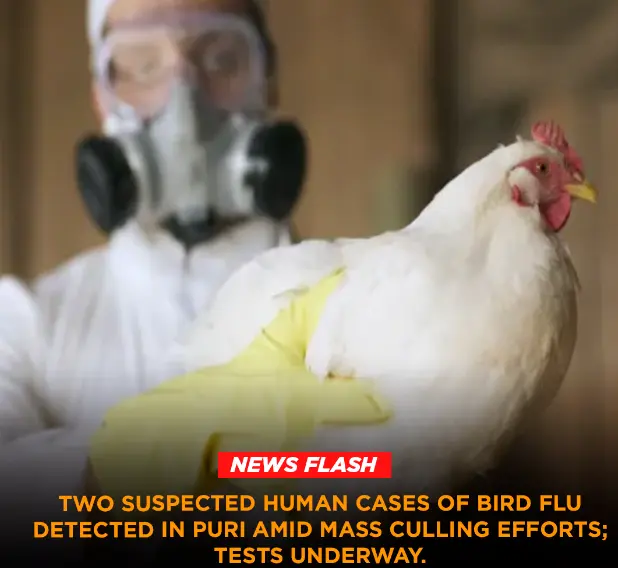Odisha has issued a high-alert following the detection of bird flu, also known as avian influenza, in several poultry farms across the state. The outbreak has led to the culling of approximately 20,000 chickens to prevent the virus from spreading further. The state’s Animal Husbandry Department has been quick to respond, implementing strict biosecurity measures and urging the public to remain cautious.

Details of the Bird Flu Outbreak
The outbreak of bird flu was confirmed after multiple cases of sudden chicken deaths were reported from various districts in Odisha. The state’s veterinary authorities collected samples from affected farms and sent them to the High Security Animal Disease Laboratory (HSADL) in Bhopal for testing. The results confirmed the presence of the H5N1 strain of the avian influenza virus, a highly contagious form of bird flu known to affect both poultry and humans.
Upon confirmation of the virus, the Odisha government swiftly activated its emergency response protocols. This included setting up containment zones in the affected areas, restricting the movement of poultry and poultry products, and conducting extensive culling operations. Around 20,000 chickens were culled within a radius of 1 km from the outbreak sites to contain the spread of the virus. Additionally, disinfection and sanitization processes have been intensified to prevent any further outbreak.
Government Response and Preventive Measures
The Odisha government has deployed rapid response teams across the affected regions to monitor and manage the situation. These teams are working closely with local authorities and poultry farmers to ensure that all necessary measures are taken to curb the spread of the virus.
Key actions being implemented include:
1. Culling and Disposal: All chickens within a 1-kilometer radius of the infected sites have been culled, and their remains disposed of in a scientifically controlled manner to prevent the virus from spreading.
2. Surveillance and Monitoring: Intensive surveillance measures are being conducted in a 10-kilometer radius around the affected areas to monitor the health of poultry. Teams are actively looking for any signs of illness or increased mortality in birds.
3. Movement Restrictions: Movement of poultry and related products has been restricted in the affected areas. All poultry markets, shops, and slaughterhouses within the containment zones have been temporarily closed.
4. Public Awareness Campaigns: The government has launched public awareness campaigns to educate citizens about the risks associated with bird flu and the precautions they should take. People are being advised to avoid contact with sick or dead birds and to report any unusual bird deaths to local authorities immediately.
5. Compensation to Farmers: The government has announced compensation for poultry farmers whose birds have been culled as part of the containment measures. This is aimed at reducing the economic impact on the farmers and encouraging them to cooperate with the authorities in controlling the outbreak.
Impact on Poultry Industry and Public Health Concerns
The bird flu outbreak has raised significant concerns among poultry farmers and the general public in Odisha. The culling of 20,000 chickens has led to economic losses for farmers, many of whom were already struggling due to previous challenges like market fluctuations and high feed costs. The state government has assured affected farmers that they will receive adequate compensation and support to mitigate their losses.
Public health officials are also on high alert due to the zoonotic potential of the H5N1 virus, which can spread from birds to humans, causing severe respiratory illnesses. While there have been no reported cases of human infection in Odisha so far, the government has urged people to take precautions. Citizens are being advised to cook poultry and eggs thoroughly, maintain good hygiene, and avoid handling sick or dead birds. Healthcare facilities have been instructed to be vigilant for any signs of human cases and are prepared to handle potential outbreaks.
Preventive Tips for the Public
To safeguard against bird flu, the Odisha government recommends the following preventive measures for the public:
– Avoid Contact with Birds: Do not touch sick or dead birds. Report any unusual bird deaths to the local authorities.
– Proper Cooking: Ensure that all poultry and eggs are cooked thoroughly. The virus can be killed by proper cooking at high temperatures.
– Maintain Hygiene: Wash hands regularly with soap and water, especially after handling raw poultry.
– Stay Informed: Keep up to date with the latest information and advisories from the government regarding the bird flu outbreak.
Looking Ahead: Ongoing Monitoring and Response
The situation in Odisha is being closely monitored by both state and central authorities. The Animal Husbandry Department is working in tandem with the Ministry of Health and Family Welfare and the Department of Animal Husbandry and Dairying at the central level to ensure coordinated efforts in managing the outbreak. Surveillance and biosecurity measures will remain in place until the threat of bird flu is completely eradicated.
While the current outbreak has caused concern, the prompt response and stringent measures implemented by the Odisha government have been crucial in preventing a larger crisis. Moving forward, continuous vigilance and public cooperation will be key to ensuring that the bird flu outbreak is contained and that both public health and the poultry industry are safeguarded.